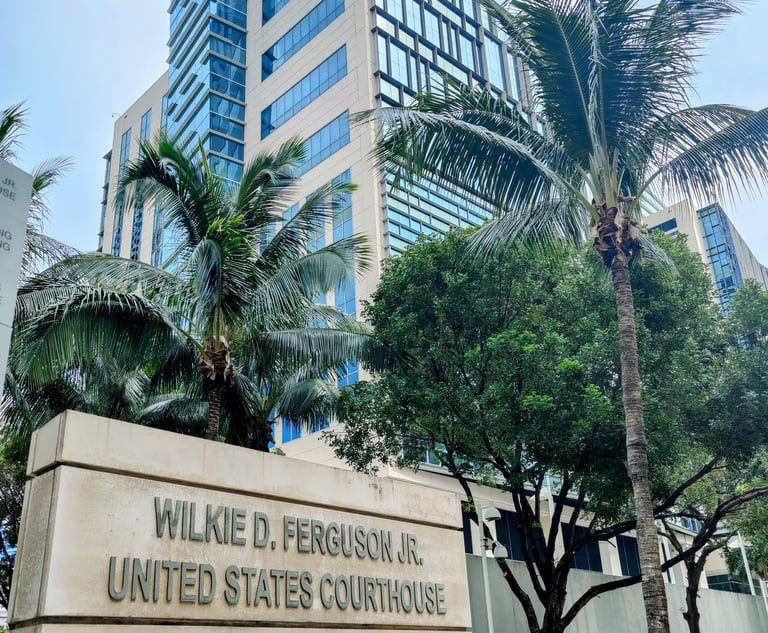 Scientist checking hemp plants in a greenhouse. Credit: HQuality/Shutterstock.com
Scientist checking hemp plants in a greenhouse. Credit: HQuality/Shutterstock.comFlorida Allowing 8 More Firms to Get Medical Pot Licenses
The new additions to Florida's rapidly growing medical-marijuana industry come from a pool of applicants that lost out in the first round of licensing in 2015 under an initial state law that allowed noneuphoric cannabis.
April 18, 2019 at 12:47 PM
5 minute read
Florida is adding eight more medical marijuana operators to the 14 businesses currently selling cannabis throughout the state.
The new additions to Florida's rapidly growing medical-marijuana industry, projected to generate more than $2.5 billion in annual revenue within five years, come from a pool of applicants that lost out in the first round of licensing in 2015 under an initial state law that allowed noneuphoric cannabis.
Since then, Florida voters broadly legalized medical marijuana, but the state has not begun an application process for investors eager to enter the state's cannabis market, which is expected to eventually become one of the largest in the nation. Florida has more than 200,000 patients qualified for medical marijuana, and that number continues to increase.
Tuesday's joint settlement agreement between the Department of Health and what are known within the industry as “one-pointers” means that all of the original applicants that sought licenses in a highly competitive process have now been approved as medical marijuana “treatment centers.”
And it reduces to three the number of available licenses under a 2017 law aimed at implementing the 2016 constitutional amendment that broadly legalizing medical marijuana. Two of those licenses are supposed to go to applicants with ties to the citrus industry, and one must go to a black farmer who was part of class-action lawsuits, known as Pigford cases, about discrimination by federal officials.
The settlement ends months of speculation about a potential deal between health officials and losing applicants.
The move is linked to a recommended order by an administrative law judge who castigated the state Office of Medical Marijuana Use for using a flawed system to decide which applicants should receive the licenses.
In June, Administrative Law Judge John Van Laningham accused health officials of a “colossal blunder” with the application-scoring process that created a “dumpster fire.”
Van Laningham's decision in the challenge filed by Nature's Way Nursery of Miami Inc. was rooted in the 2017 law and the health department's original process to grant five licenses after the Legislature legalized noneuphoric medical marijuana in 2014.
Under the 2017 law, health officials were required to issue licenses to applicants that had legal challenges pending as of January 2017 or who had scored within one point of the highest-ranked applicants in five regions.
Van Laningham's recommended order prompted the state to grant a license to Nature's Way, opening a flood of challenges by other applicants who argued they were eligible for licenses because they fell within one point of the highest scorer in their regions of the state.
While former Gov. Rick Scott's administration for months had been rumored to be working out a deal with the “one-pointers,” it was his successor, Ron DeSantis, who settled the matter after taking office in January.
Under the joint agreement, Spring Oaks Greenhouses Inc.; Redland Nursery Inc.; Dewar Nurseries Inc.; Tree King-Tree Farm Inc.; Perkins Nursery Inc.; Bill's Nursery Inc.; DeLeon's Bromeliads Inc.; and Hart's Plant Nursery Inc. are set to receive licenses.
In exchange for receiving licenses, the eight new medical marijuana operators had to agree to certain conditions laid out by the DeSantis administration.
The agreement requires the operators to agree they “intend to provide enhanced patient access by locating a percentage of dispensaries within impoverished communities and rural areas that have been adversely affected by extraordinary economic events or natural disasters.”
The operators also had to promise to require background checks of all employees that are “more stringent than required under existing Florida law.”
And the new operators have to “adopt security and anti-diversion policies that are more stringent than required under Florida law.”
The medical marijuana treatment centers, known as MMTCs, have to request authorization to start cultivating cannabis within 30 days, according to lawyers involved with the settlement.
DeSantis and the Department of Health have “resolved significant and expensive litigation surrounding the 2015 application process” through the settlements, Jim McKee, a lawyer who represents Perkins Nursery, told The News Service of Florida.
“At the same time, they have also enhanced patient access by issuing additional MMTC licenses as authorized by statute. The new licensees can now focus on working closely with the Department of Health to quickly get up and running, and turn their attention to serving Florida patients,” McKee said.
DeSantis has taken a markedly different approach to medical marijuana than Scott on other fronts as well.
Shortly after he took office, DeSantis issued an ultimatum for lawmakers to repeal the state's ban on smoking medical marijuana. The Republican governor threatened to drop the state's appeal of a court order finding that the ban ran afoul of the constitutional amendment if lawmakers did not act, but they bowed to pressure from DeSantis, who quickly signed the legislation into law last month.
Dara Kam reports for the News Service of Florida.
This content has been archived. It is available through our partners, LexisNexis® and Bloomberg Law.
To view this content, please continue to their sites.
Not a Lexis Subscriber?
Subscribe Now
Not a Bloomberg Law Subscriber?
Subscribe Now
NOT FOR REPRINT
© 2024 ALM Global, LLC, All Rights Reserved. Request academic re-use from www.copyright.com. All other uses, submit a request to [email protected]. For more information visit Asset & Logo Licensing.
You Might Like
View All
'Close Our Borders?' Senate Judiciary Committee Examines Economics, Legal Predicate for Mass Deportation Proposal
3 minute read

'Stab Venequip in the Back': Caterpillar Faces $100M Lawsuit in Miami Federal Court
3 minute read
Another Roundup Trial Kicks Off in Missouri. Monsanto Faces 3 Plaintiffs
4 minute readTrending Stories
Who Got The Work
Michael G. Bongiorno, Andrew Scott Dulberg and Elizabeth E. Driscoll from Wilmer Cutler Pickering Hale and Dorr have stepped in to represent Symbotic Inc., an A.I.-enabled technology platform that focuses on increasing supply chain efficiency, and other defendants in a pending shareholder derivative lawsuit. The case, filed Oct. 2 in Massachusetts District Court by the Brown Law Firm on behalf of Stephen Austen, accuses certain officers and directors of misleading investors in regard to Symbotic's potential for margin growth by failing to disclose that the company was not equipped to timely deploy its systems or manage expenses through project delays. The case, assigned to U.S. District Judge Nathaniel M. Gorton, is 1:24-cv-12522, Austen v. Cohen et al.
Who Got The Work
Edmund Polubinski and Marie Killmond of Davis Polk & Wardwell have entered appearances for data platform software development company MongoDB and other defendants in a pending shareholder derivative lawsuit. The action, filed Oct. 7 in New York Southern District Court by the Brown Law Firm, accuses the company's directors and/or officers of falsely expressing confidence in the company’s restructuring of its sales incentive plan and downplaying the severity of decreases in its upfront commitments. The case is 1:24-cv-07594, Roy v. Ittycheria et al.
Who Got The Work
Amy O. Bruchs and Kurt F. Ellison of Michael Best & Friedrich have entered appearances for Epic Systems Corp. in a pending employment discrimination lawsuit. The suit was filed Sept. 7 in Wisconsin Western District Court by Levine Eisberner LLC and Siri & Glimstad on behalf of a project manager who claims that he was wrongfully terminated after applying for a religious exemption to the defendant's COVID-19 vaccine mandate. The case, assigned to U.S. Magistrate Judge Anita Marie Boor, is 3:24-cv-00630, Secker, Nathan v. Epic Systems Corporation.
Who Got The Work
David X. Sullivan, Thomas J. Finn and Gregory A. Hall from McCarter & English have entered appearances for Sunrun Installation Services in a pending civil rights lawsuit. The complaint was filed Sept. 4 in Connecticut District Court by attorney Robert M. Berke on behalf of former employee George Edward Steins, who was arrested and charged with employing an unregistered home improvement salesperson. The complaint alleges that had Sunrun informed the Connecticut Department of Consumer Protection that the plaintiff's employment had ended in 2017 and that he no longer held Sunrun's home improvement contractor license, he would not have been hit with charges, which were dismissed in May 2024. The case, assigned to U.S. District Judge Jeffrey A. Meyer, is 3:24-cv-01423, Steins v. Sunrun, Inc. et al.
Who Got The Work
Greenberg Traurig shareholder Joshua L. Raskin has entered an appearance for boohoo.com UK Ltd. in a pending patent infringement lawsuit. The suit, filed Sept. 3 in Texas Eastern District Court by Rozier Hardt McDonough on behalf of Alto Dynamics, asserts five patents related to an online shopping platform. The case, assigned to U.S. District Judge Rodney Gilstrap, is 2:24-cv-00719, Alto Dynamics, LLC v. boohoo.com UK Limited.
Featured Firms
Law Offices of Gary Martin Hays & Associates, P.C.
(470) 294-1674
Law Offices of Mark E. Salomone
(857) 444-6468
Smith & Hassler
(713) 739-1250






